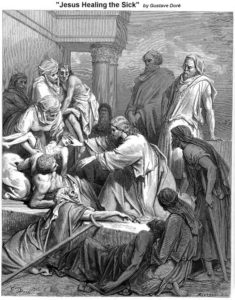Thoughts on Sunday’s Lessons for July 22, 2018

Jesus healing in the land of Gennesaret, by Gustave Doré (1832-1883). Engraving in The Holy Scriptures, Old and New Testaments, published in 1885, Stuttgart, Germany. (Click image to enlarge.)
As our Track One first readings continue following the life of King David, remember that David’s is the Messianic line that Christians trace down the ages as the ancestry of Jesus. In Sunday’s reading, David, having consolidated Israel and Judah under his rule, becomes concerned that the people’s custom of keeping the Ark of the Covenant in a mere tent is insufficient to reflect the greatness of God. David decides to build a great temple, but God, speaking through the Prophet Nathan, dismisses this idea. God’s home, Nathan declares, is with the House of David, the dynasty of God’s people.
First Reading (Track Two): Jeremiah 23:1-6
The image of a shepherd as metaphor for a caring leader who protects the flock recurs in several of our readings today. First we see the prophet Jeremiah speaking fierce truth to the power of Babylon, which had destroyed Jerusalem and the temple and was holding many of the people in exile. God is going to round up the remnant of his scattered flock and bring them home like a shepherd with his flock, the prophet declares, and the oppressors will be punished for their evil. Soon God will restore the glory of the lost kingdom, raising up a mighty new king like David.
Psalm (Track One): Psalm 89:20-37
Sunday’s Psalm verses celebrate God’s covenant with David and his descendants, a royal family that God made to endure forever. David’s line would last even through war’s devastation and exile’s pain, the Psalmist sings; David’s line would remain even in spite of fears of God’s wrath over the nation having broken its covenant with God. Yes, the people’s iniquities might bring punishment, the rod and the lash, but their actions will never take away God’s love nor prevent the rise of a new David, Messiah and King.
Psalm (Track Two): Psalm 23
Now we return to the beloved 23rd Psalm. We hear its verses so often that most of us probably can read along without looking at the words. It appears five times in the three-year Lectionary cycle and also is often chosen for funeral services. Surely it is so popular because of its assurance that God’s goodness and mercy are always with us. Reading the Psalm, feeling the comforting presence of the Shepherd, puts us back in touch with God’s restoring grace.
Second Reading: Ephesians 2:11-22
The author of the letter to the Ephesians strives to assure formerly Gentile Christians that they are fully invested in the community, completely united with their Jewish Christian sisters and brothers without any need to follow Jewish law. The author writes that all have become one through Christ Jesus, the cornerstone, who brings near even those who were far away. At the time of this writing, late in the first century after the fall of the Temple, Jewish Christianity and rabbinic Judaism were splitting apart. Christianity was actively gathering in Gentile converts, and it was important to emphasize the truth that all had become one in Christ.
Gospel: Mark 6:30-34, 53-56
Two Sundays past, we heard Jesus sending his disciples out in pairs to heal the sick, cast out demons, and teach the good news. They’ve come back home now, eager to talk about their mission. Apparently they’re worn out, too, as Jesus invites them go in the boat to a quiet place to rest. But the crowds following Jesus are too eager to wait, so they follow like a herd of sheep, and Jesus feels a shepherd’s compassion for them. Later, they cross over the water and land at Gennesaret, where another large flock comes running to see Jesus. Of course this loving shepherd willingly touches and heals all who come.
What are “Track 1” and “Track 2”?
During the long green season after Pentecost, there are two tracks (or strands) each week for Old Testament readings. Within each track, there is a Psalm chosen to accompany the particular lesson.
The Revised Common Lectionary allows us to make use of either of these tracks, but once a track has been selected, it should be followed through to the end of the Pentecost season, rather than jumping back and forth between the two strands.
For more information from LectionaryPage.net, click here.
